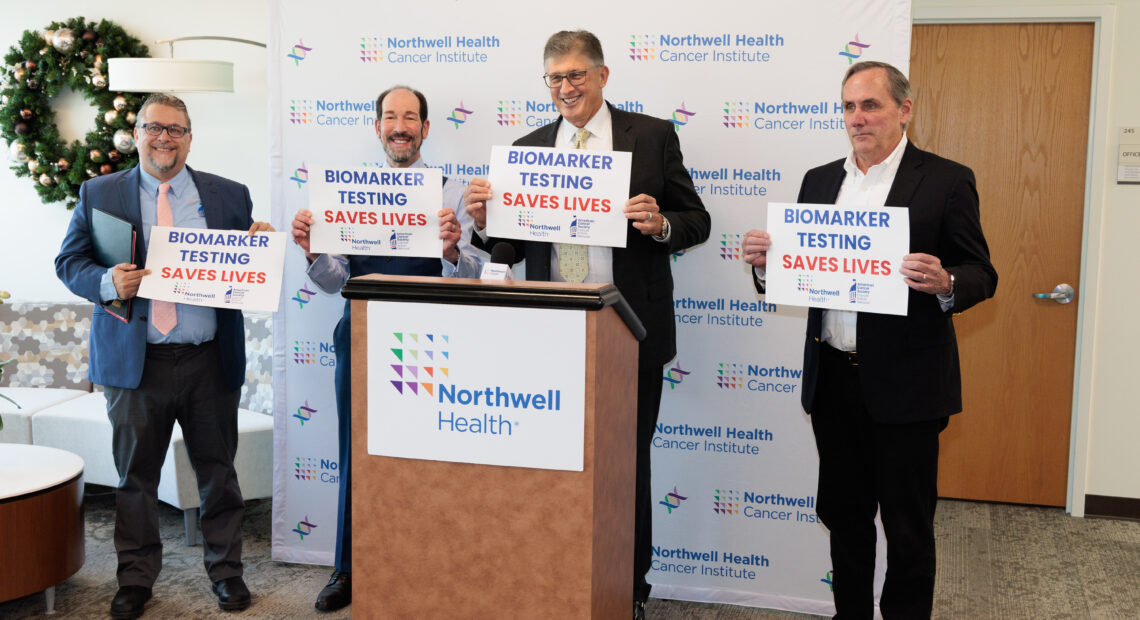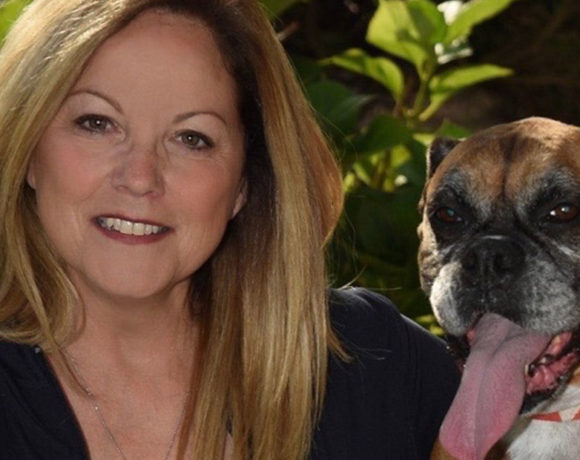Long Island health care providers, cancer survivors and patient advocates gathered today at the Northwell Health Cancer Institute to call on Governor Kathy Hochul to prioritize health equity by improving access to biomarker testing and signing Senate Bill 1196a / Assembly Bill 1673a into law.
Senate Bill 1196a / Assembly Bill 1673a seeks to ensure comprehensive biomarker testing is covered by all state-regulated health plans, including Medicaid, when medically appropriate. The bill passed the Legislature in June with support from over 65 patient and provider groups, who now fear that Governor Hochul will veto the bill or severely limit the scope of the bill, stripping the proposal of its potential impact.
Biomarker testing has become a game-changing part of cancer care given its role in opening the door to targeted treatments that can lead to improved survivorship and quality of life.
Hal Sieger, 65, is a cancer survivor from Greenlawn, NY, who beat Stage 4 melanoma in 2012 thanks in part to biomarker testing. Sieger credits access to the testing and Northwell Health for saving his life. “I was first diagnosed in 1988 and was cancer-free for 22 years until the recurrence of melanoma in 2012. Thankfully, biomarker testing and a new drug were available to me. I am extremely grateful for the advances in science, which allowed me to see my three children graduate high school and college.”
Despite the growing importance of biomarker testing in personalized medicine, significant barriers to biomarker testing persist. This results in some patients being forced to decide whether to pay out-of-pocket or go without the testing that may connect them with lifesaving treatment.
“Biomarker testing in cancer is widely recognized and accepted as a critical approach to cancer treatment, prognosis and diagnosis; it represents the current standard of care for cancer treatment, said Jeff Boyd, PhD, chief scientific officer and director of the Center for Genomic Medicine at Northwell Health Cancer Institute. “This is not about future research or political ideologies—it’s a recognized and crucial element in the fight against cancer.”
Physician-in-chief and executive director of the Northwell Health Cancer Institute, Richard Barakat, MD, said, “As the largest provider of cancer care in New York, we believe that genomic profiling is integral to providing personalized and effective cancer care, and we stand as a strong proponent, urging for continued support and recognition, especially from Governor Hochul, to ensure access to the highest standard of care for our patients.”
Unfortunately, not all communities are benefitting from the latest advancements in biomarker testing and precision medicine. Communities of color, residents of rural areas and individuals with lower socioeconomic status are less likely to receive biomarker testing.
Senate Bill 1196a / Assembly Bill 1673a will make it so that every New Yorker who is insured by a state-regulated insurance plan, including Medicaid, and can benefit from biomarker testing, will have coverage for the game changing resource.
“The only thing that is standing between New Yorkers and the care they deserve is a lack of Governor Hochul’s signature on Senate Bill 1196a / Assembly Bill 1673a,” said Michael Davoli, a senior government relations director of the American Cancer Society Cancer Action Network (ACS CAN), at the press conference.
The bipartisan biomarker testing proposal, which has received the support of every Assemblymember and Senator from Long Island, would not just benefit cancer patients. Given that biomarker testing is increasingly important in the treatment of other diseases, including, arthritis and other autoimmune conditions, rare diseases and preeclampsia, legislative sponsors Sen. Roxanne Persaud and Rep. Pamela Hunter worked to ensure that the legislation put forth was disease-agnostic and designed to benefit the greatest number of New Yorkers battling illness.
“The ALS Association supports expanding coverage of biomarker testing,” said Kuldip Dave, PhD, senior vice president of research at the ALS Association. “With biomarker testing, ALS patients will be more able to unlock precision medicine’s value and cost-savings potential. Without action to expand coverage and access to biomarker testing, advances in precision medicine could exacerbate existing disparities in access to care and, consequently, health outcomes associated with race, ethnicity, income, and geography. Ensuring access to future biomarker testing will help to optimize current treatments and cures for patients living with ALS.”
Thirteen other states have already enacted comprehensive, disease-agnostic biomarker testing bills nearly identical to the one the providers, patients and advocates are calling on Governor Hochul to sign.
By the end of this year, approximately 31,320 New Yorkers will have died from cancer, and countless more will suffer from a disease—the side effects of which could be mitigated by biomarker testing. Improved access to biomarker testing can make it so that more New Yorkers get connected to the treatment that they need with the goal of improving outcomes and reducing suffering from their illnesses.
Members of the media are invited to interview health care providers from Northwell Health, volunteers and ACS CAN staff about the importance of expanding equitable access to biomarker testing in New York. For more information on precision medicine, cancer biomarkers, current barriers to biomarker testing and ACS CAN’s policy recommendations, visit: www.fightcancer.org/biomarkers.








Recent Comments